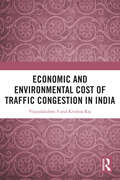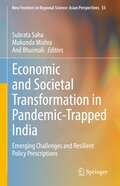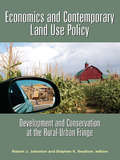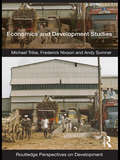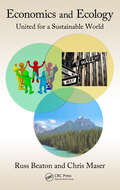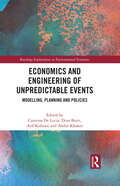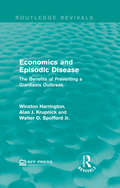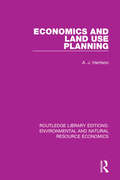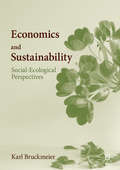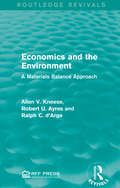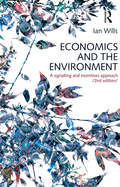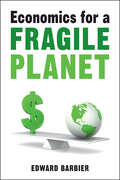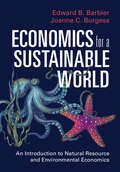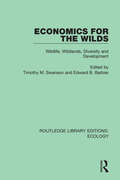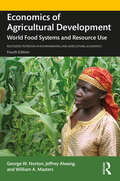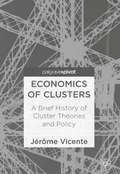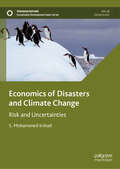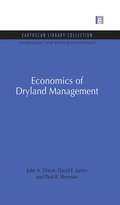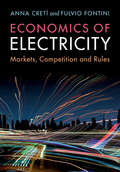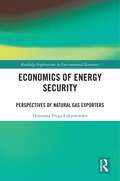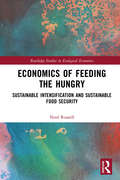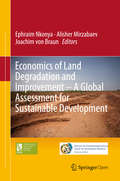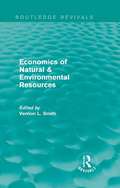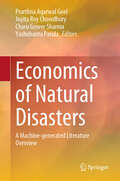- Table View
- List View
Economic and Environmental Cost of Traffic Congestion in India
by Krishna Raj Vijayalakshmi S SThis book explores one of the most prevailing problems of the contemporary urban world, i.e. traffic congestion and its economic, environmental, and health implications. Generally viewed as an urban menace, the problem of traffic congestion has huge economic implications, which are often overlooked by urban planners. This book examines and quantifies the costs and adverse consequences and of traffic congestion, which include emissions, loss of productive hours, fuel wastage, and the adverse effects on the health of commuters, among others. It provides a comprehensive and scientific understanding of the underlying problems of traffic gridlocks by analyzing empirical evidence from Bengaluru, a city in South India. It also offers solutions and highlights innovative measures that draw from both economic and engineering perspectives to counter and reduce the tangible and intangible costs of traffic conjestion. This book will be of interest to both academic and non-academic readers of economics, environmental economics and econometrics, transport economics, urban planning, transport geography, as well as planners and policy makers.
Economic and Societal Transformation in Pandemic-Trapped India: Emerging Challenges and Resilient Policy Prescriptions (New Frontiers in Regional Science: Asian Perspectives #55)
by Mukunda Mishra Subrata Saha Anil BhuimaliThis book acquaints the reader with the critical changes in India’s economy and society amidst the unprecedented pandemic outbreak of COVID-19, which has been devastating by breaking all prior records of illness and fatality. The present crisis is shown to be more than an acute health hazard as it carries with it other threats associated with the economy, society, culture, psychology, and politics. The dynamic driving forces that have a significant bearing on life, space, and time are explored, providing a basis on which social scientists can understand the prevailing equations and project the unforeseen future to contribute to a policymaking mechanism. The Indian scenario presented here takes into account how the COVID-19-induced lockdown of transport services, closing of factories, and restrictions on mobilization have caused the economy to face a recession, affecting mostly the unorganized sector. Travel restrictions and quarantines affecting hundreds of millions of people have left Indian factories short of labour, causing havoc in the production system. Semi-skilled jobholders have lost their employment, and the country has witnessed the plight of large pools of migrant labourers returning on foot to their homelands hundreds of miles away with their families and belongings. Contributors to this volume are drawn from diverse disciplines, displaying the solidarity of academic knowledge in a physically divided world. This common platform is provided to the practitioners of relevant academic disciplines under the umbrella of regional sciences – a forum for the exchange of ideas that may be effective in the sustainable management of the crisis and a way forward after it is mitigated. Thought-provoking discussions regarding different facets of the crisis are relevant not only to the current times but also to being prepared for the unforeseen post-COVID economic and societal order.
Economics and Contemporary Land Use Policy: Development and Conservation at the Rural-Urban Fringe
by Robert J. Johnston Stephen K. SwallowAs external forces increase the demand for land conversion, communities are increasingly open to policies that encourage conservation of farm and forest lands. This interest in conservation notwithstanding, the consequences of land-use policy and the drivers of land conversions are often unclear. One of the first books to deal exclusively with the economics of rural-urban sprawl, Economics and Contemporary Land-Use Policy explores the causes and consequences of rapidly accelerating land conversions in urban-fringe areas, as well as implications for effective policy responses. This book emphasizes the critical role of both spatial and economic-ecological interactions in contemporary land use, and the importance of a practical, policy-oriented perspective. Chapters illustrate an interaction of conceptual, theoretical, and empirical approaches to land-use policy and highlight advances in policy-oriented economics associated with the conservation and development of urban-fringe land. Issues addressed include (1) the appropriate role of economics in land-use policy, (2) forecasting and management of land conversion, (3) interactions among land use, property values, and local taxes, and (4) relationships among rural amenities, rural character, and urban-fringe land-use policy. Economics and Contemporary Land-Use Policy is a timely and relevant contribution to the land-use policy debate and will prove an essential reference for policymakers at the local, state, and federal levels. It will also be of interest to students, academics, and anyone with an interest in the practical application of economics to land-use issues.
Economics and Development Studies
by Andy Sumner Michael Tribe Frederick NixsonDevelopment studies textbooks and courses have sometimes tended to avoid significant economic content. However, without an understanding of the economic aspects of international development many of the more complex issues cannot be fully comprehended. Economics and Development Studies makes the economic dimension of discourse around controversial issues in international development accessible to second and third year undergraduate students working towards degrees in development studies. Following an introductory chapter outlining the connections between development economics and development studies, this book consists of eight substantive chapters dealing with the nature of development economics, economic growth and structural change, economic growth and developing countries, economic growth and economic development since 1960, the global economy and the Third World, developing countries and international trade, economics and development policy, and poverty, equality and development economists, with a tenth concluding chapter. This book synthesizes existing development economics literature in order to identify the salient issues and controversies and make them accessible and understandable. The concern is to distinguish differences within the economics profession, and between economists and non-economists, so that the reader can make informed judgments about the sources of these differences, and about their impact on policy analysis and policy advice. The book features explanatory text boxes, tables and diagrams, suggestions for further reading, and a listing of the economic concepts used in the chapters.
Economics and Ecology: United for a Sustainable World (Social Environmental Sustainability)
by Chris Maser Charles R. BeatonThe earth, our home, is in crisis. There are two sides to this crisis-our global economy, and its effect on the ecology of our home planet. Despite conventional thinking that typical monetary and fiscal manipulations will put us back on the path of economic growth, the reality is not that simple. Meanwhile, the natural environment is sending unmist
Economics and Engineering of Unpredictable Events: Modelling, Planning and Policies (Routledge Explorations in Environmental Economics)
by Caterina De LuciaIn recent decades, the intensification of unpredictable events including the Covid-19 outbreak, Brexit, trade warfare, religion-inspired terrorism and civil wars, and climate change has resulted in serious loss of human lives and property, a decrease in biodiversity and natural hazards (with long-term negative impacts on environment), and impeded social and economic development. Economics and Engineering of Unpredictable Events: Modelling, Planning and Policies provides an integrated view of the management of unpredictable events incorporating three major perspectives: economic management, environmental planning and engineering models. Contributors from economics, planning, regional science, and engineering address key questions including; How resilient are human societies and their habitats? What should societies do to shift from being vulnerable to being more resilient? And what role should planning and policies play to protect communities and the natural environment? The chapters cover academic debates, conceptual reflections, case studies, methods, and strategy development with particular reference to mitigation and adaptation in face of unpredictable events. This book is of particular interest to readers of economic policy, urban and regional planning and engineering.
Economics and Episodic Disease: The Benefits of Preventing a Giardiasis Outbreak (Routledge Revivals)
by Winston Harrington Alan J. Krupnick Walter O. Spofford Jr.Originally published in 1991, this study uses the 1983 outbreak of Giardiasis in Luzerne County, Pennsylvania as a case study to explore the social costs of waterborne illnesses to a community. With over 6,000 people affected in that particular case, Economics and Episodic Disease emphasises the importance of Federal and State drinking water standards to protect the population from contamination whilst also commenting how regulations can be applied to other areas within public health as well as how to appraise the damage caused to surface water by the release of hazardous substances. This title will be of interest to students of Environmental Studies.
Economics and Land Use Planning (Routledge Library Editions: Environmental and Natural Resource Economics)
by A. J. HarrisonThe aim of this book, first published in 1977, is to use the tools developed by modern microeconomics to provide a framework for the analysis of policies towards the allocation of land and the control of activities using land. The principle focus of the book is the general justification for intervention in the urban land and property markets, the principles for evaluating such intervention and the proper role of the public sector within the urban economy. It also considers in some detail the practical problems involved in putting these principles into effect.
Economics and Sustainability: Social-Ecological Perspectives
by Karl BruckmeierThis textbook provides an overview of economic perspectives on sustainability. It synthesises economic, ecological and interdisciplinary sustainability research and by applying an integrated social-ecological and economic framework, demonstrates how this research can be improved and implemented in practice. Split into three parts, the book begins by introducing a range of topics forming the basis of knowledge needed to understand the varying sustainability discourses in economics, ecology and interdisciplinary sustainability research. Chapters cover the political context of sustainability; the history of sustainability in European environmental discourses dating back to the seventeenth century; as well as various problems and forms of interdisciplinary knowledge integration and synthesis in the sustainability process. Part II reviews the core economic themes relevant to sustainable development including natural resource management, environmental economics and ecological economics. Also highlighted are often neglected issues such as conflicts, disasters and interrelated crises on the way towards sustainability. The chapters in Part III discuss the future of the sustainability process. They argue for the necessity of overhauling the relationship between science and practice; explore failures and the unforeseen difficulties of sustainability transformation; and discuss how to enable a long term sustainability process that reaches into the distant future.An innovative resource for a broad range of interdisciplinary programmes on sustainability. The book will be an invaluable reference for master and PhD students, instructors, researchers and practitioners in sustainability governance.
Economics and the Environment: A Materials Balance Approach (Routledge Revivals)
by Robert U. Ayres Allen V. Kneese Ralph C. d'ArgeThis monograph length report, first published in 1970, originated from a program of research at Resources for the Future that dealt with the management of residuals and of environmental quality. It presents some of the broad concepts that the program was based on and represents the effort to break out of the traditional approach in pollution and policy research, which had treated air, water, and solid waste problems as separate categories. This book will be of interest to students of economics and environmental studies.
Economics and the Challenge of Global Warming
by Charles S. PearsonEconomics and the Challenge of Global Warming is a balanced and comprehensive analysis of the role of economics in confronting global warming, the central environmental issue of the twenty-first century. It avoids a technical exposition in order to reach a wide audience and is up to date in its theoretical and empirical underpinnings. It is addressed to all who have some knowledge of economic concepts and a serious interest in how economics can (and cannot) help in crafting climate policy. The book is organized around three central questions. First, can benefit-cost analysis guide us in setting warming targets? Second, what strategies and policies are cost-effective? Third, and most difficult, can a global agreement be forged between rich and poor, North and South? While economic concepts are foremost in the analysis, they are placed within an accessible ethical and political matrix. The book serves as a primer for the post-Kyoto era.
Economics and the Environment: A signalling and incentives approach
by Ian WillsCoordinating our use of the earth's natural resources is not easy. Resource users are many, their goals diverse, and their impacts on the environment often uncertain.How we use those resources depends on the signals and incentives we receive, from either the market or our governments. These systems encourage certain uses of natural resources, but they are not perfect. We harm the environment not out of malice, but because we do not know the consequences of our actions, or the incentives for harm are too great to ignore.Economics and the Environment argues that, by lowering the cost and improving the quality of the necessary signals and incentives, we can better reconcile our diverse interests in the environment. It introduces an economic way of thinking about environmental issues, without assuming a background in economics:* how the economy and the environment interact* how resource use is coordinated in ideal market and planned economies* the barriers to ideal signalling and incentives in real markets and real government planning* the economist's tools for dealing with natural resource issues* the uncertainty and complexity of environmental issues: climate change, water rights, air pollution and overharvesting of common resources.This second edition of Economics and the Environment is fully updated and includes new material on sustainability, valuation of environmental changes, the prospects for international cooperation under the Kyoto Protocol and the problems of defining and enforcing measures to protect biodiversity. It offers students in both economics and environmental studies programs a coherent framework for understanding our major environmental problems.'Ian Wills succeeds in providing a fresh perspective . . . a very interesting and informative textbook.'Economic Record
Economics for a Fragile Planet: Rethinking Markets, Institutions and Governance
by Edward BarbierIn a world of growing environmental risks and ecological scarcities, ensuring a safe Anthropocene for humankind is essential. Managing an increasingly "fragile" planet requires new thinking on markets, institutions and governance built on five principles: ending the underpricing of nature, fostering collective action, accepting absolute limits, attaining sustainability, and promoting inclusivity. Rethinking economics and policies in this way can help to overcome the global challenges posed by climate change, biodiversity loss, freshwater scarcity, and deteriorating marine and coastal habitats. It requires decoupling wealth creation from environmental degradation through business, policy and financial actions aimed at better stewardship of the biosphere. In this book, renowned environmental economist Edward Barbier offers a blueprint for a greener and more inclusive economy, and outlines the steps we must take now to build a post-COVID world that limits environmental threats while sustaining per capita welfare.
Economics for a Sustainable World: An Introduction to Natural Resource and Environmental Economics
by Edward B. Barbier Joanne C. BurgessWritten for undergraduate students with little or no exposure to economics, this introductory textbook offers a new perspective on environmental economics for the 21st century. It explains how economics for a sustainable world requires a new approach: accepting that the economy is intrinsically dependent on nature. Drawing on up-to-date case studies from around the globe, the book examines how economic concepts and techniques can apply to a wide range of environmental challenges while ensuring that poor and vulnerable members of society are included in progress toward sustainable development. The book also addresses current environmental policy options and innovations at the local, regional, and international levels. Chapters cover key topics such as climate change, pollution, energy, minerals, forests, land use, oceans, biodiversity, and water scarcity. Included in the book are the following pedagogical features: learning objectives, boxed examples, discussion questions, lists of further resources, and a glossary.
Economics for the Wilds: Wildlife, Wildlands, Diversity and Development (Routledge Library Editions: Ecology #13)
by Edward B. Barbier Timothy M. SwansonOriginally published in 1992 Economics for the Wilds argues that an economics that properly values the resources of the wilds offers the best long-term security for their future. Most of the world’s wilds have, in fact, always been utilized by local societies who have managed their resources sustainably, and one important guarantee for their preservation is therefore the continued participation of those communities and an adequate reward to them for their management. The book looks at the complexity and global nature of the issues, at the application of economics to the wilds and at the policies for their conservation and sustainable management which then result. It also examines specific forms of utilization of wild species and habitats, both sustainable and unsustainable, and including community-based development, tourism, the use of rainforest products, poaching and the impact of conservation on wildlife use. The book concludes that a comprehensive utilization strategy for wild resources is needed to ensure their continued existence and the continued flow of benefits from them.
Economics of Agricultural Development: World Food Systems and Resource Use (Routledge Textbooks in Environmental and Agricultural Economics)
by William A. Masters Jeffrey Alwang George W. NortonEconomics of Agricultural Development examines the causes, severity, and effects of poverty, population growth, and malnutrition in developing countries. It discusses potential solutions to these problems, progress made in many countries in recent years, and the implications of globalization for agriculture, poverty, and the environment. Topics covered in the book include: Means for utilizing agricultural surpluses to further overall economic development The sustainability of the natural resource environment Gender issues in relation to agriculture and resource use The contribution of improved technologies to agricultural development The importance of agricultural policies and institutions to development and trade Actions to encourage more rapid agricultural and economic development This new edition reflects the following developments: Growth in environmental challenges due to climate change Continued progress in agricultural and economic development in many low-income countries while other countries and regions are being left behind Continued growth in demand for higher-valued farm products This book is essential reading for undergraduate students seeking to understand the economics of agricultural development and the world food system, including environmental and human consequences, international trade, and capital flows. It contains a wealth of real-world case studies and is accompanied by a website.
Economics of Clusters: A Brief History of Cluster Theories and Policy
by Jérôme VicenteWhen we talk about clusters, it's the fabulous destiny of Silicon Valley that first comes to mind – the place where entrepreneurs and policymakers alike flock. But do we really understand the complex mechanics of these clusters? What tools can economics and other related disciplines use to analyze their performance? When it comes to spending taxpayer money to support cluster development, do benefits actually exceed costs? This book provides a synthesis of cluster theory and presents methodologies to analyze their structure and performance. It also contains insights into how to renew regional innovation policy.The French edition of this volume was granted Best Book in Economics 2016 by The French Association of Economics (AFSE)
Economics of Disasters and Climate Change: Risk and Uncertainties (Sustainable Development Goals Series)
by S. Mohammed IrshadThis book discusses the theory, method, and practice of risk economics and also examines climate change and disaster's theoretical and practical implications on capital formation and accumulation in the contemporary economic system. It explores the theoretical and practical challenges of engaging with climate and disaster risk in the changing context of capital investments and market expansion. It explains the emergence of an at-risk society and its interface with economic decision-making. The critical issue the book explores is the implication of certainty over the return period of risk and its influence on the economic behaviour of the state and market institutions. Risk sharing and governing economic risks in the context of financial capitalism is a major theoretical issue the book engages with. It offers a new conceptual framework to see how risk economics evolves out of increasing climate and disaster risks and a counter-discourse on the mainstream economic theoretical standpoint on capital and explains the economics of capital replacement in vulnerable social systems. These broader perspectives will be valuable to economists, researchers, experts in disaster and climate risk, corporate professionals, economics educators, specialists in financial economics, and those involved in development policy-making. This book offers a detailed discussion of risk mitigation and its interface with sustainable development goals including climate action.
Economics of Dryland Management: Economics Of Dryland Management (Environmental and Resource Economics Set)
by David E. James John A. Dixon Paul B. ShermanWe have always had land in which the agricultural productivity is limited because there is not enough moisture. Systems of farming and burning often degrade dryland further until it is desert. Today, however, the problem is becoming much more serious. Over 20 per cent of the world's population lives in dryland areas, and unless action is taken drylands will increase dramatically. This book focuses on the people who live and .farm in the drylands, their use of land resources and the economic returns from their decisions. In a clear and thorough economic appraisal, the authors show how it is still possible to arrest the problem. Originally published in 1989
Economics of Electricity: Markets, Competition and Rules
by Anna Cretì Fulvio FontiniThis comprehensive and up-to-date book explains the economic rationale behind the production, delivery and exchange of electricity. Cretì and Fontini explain why electricity markets exist, outlining the economic principles behind the exchange and supply of power to consumers and firms. They identify the specificities of electricity, as compared to other goods, and furthermore suggest how markets should be optimally designed to produce and deliver electricity effectively and efficiently. The authors also address key issues, including how electricity can be decarbonized. Written in a technical yet accessible style, this book will appeal to readers studying power system economics and the economics of electricity, as well as those more generally interested in energy economics, including engineering and management students looking to gain an understanding of electricity market analysis.
Economics of Energy Security: Perspectives of Natural Gas Exporters (Routledge Explorations in Environmental Economics)
by Honorata Nyga-ŁukaszewskaThere has been a burgeoning interest in energy security in recent years due to the transformation of the energy landscape through deepening market deregulation, rising environmental challenges, growing energy hunger, and significant political changes. Depicting energy security as an evolving concept that absorbs economic and political conditions, this book adopts an economic approach to energy security in the international gas market. Uniquely, the book explores the theoretical assumptions and practical consequences attached to both demand and supply-side security in global energy markets. It investigates why energy exporters are so protective of independence in energy exports. The book also looks at the critically important issue of environmental aspects of energy security, particularly around climate change. It also analyses the potential for a cartel in the international gas market, similarly to the oil industry. This book will be of much interest to readers in energy economics, energy security, energy policy, IR/security studies, and relevant policy-makers.
Economics of Feeding the Hungry: Sustainable Intensification and Sustainable Food Security (Routledge Studies in Ecological Economics)
by Noel RussellAs productivity expands to cater for population increase and shifting diets, many individuals remain hungry, whilst others suffer obesity, and significant amounts of food are wasted. Yet, this triple dilemma oversimplifies the underlying complexity. This book explores this complexity from an economics perspective, looking at the processes involved and the institutional structures that direct and constrain their interaction. After discussing alternative approaches to measuring hunger and food insecurity, this volume considers the four dimensions of food security: availability, affordability, utilization and stability. In summarising the main debates, issues and policy interventions, Russell discusses the problems of ensuring sufficient food in the face of ever-slowing growth in productivity and constraints on land and water. The problems of food affordability, the need for safety nets, and the need for poverty alleviation measures that reach excluded and disadvantaged groups is also discussed. This is alongside an exploration of issues related to food utilization and the problems of hidden hunger, obesity, food waste, and the interventions needed to relieve these problems. This volume is of great interest to those who study rural development, ecological economics and development economics, as well as policy makers who seek a better understanding of underlying processes, ongoing and emerging issues, and potentially relevant interventions.
Economics of Land Degradation and Improvement - A Global Assessment for Sustainable Development
by Joachim Braun Ephraim Nkonya Alisher MirzabaevThis volume deals with land degradation, which is occurring in almost all terrestrial biomes and agro-ecologies, in both low and high income countries and is stretching to about 30% of the total global land area. About three billion people reside in these degraded lands. However, the impact of land degradation is especially severe on livelihoods of the poor who heavily depend on natural resources. The annual global cost of land degradation due to land use and cover change (LUCC) and lower cropland and rangeland productivity is estimated to be about 300 billion USD. Sub-Saharan Africa (SSA) accounts for the largest share (22%) of the total global cost of land degradation. Only about 38% of the cost of land degradation due to LUCC - which accounts for 78% of the US$300 billion loss - is borne by land users and the remaining share (62%) is borne by consumers of ecosystem services off the farm. The results in this volume indicate that reversing land degradation trends makes both economic sense, and has multiple social and environmental benefits. On average, one US dollar investment into restoration of degraded land returns five US dollars. The findings of the country case studies call for increased investments into the rehabilitation and restoration of degraded lands, including through such institutional and policy measures as strengthening community participation for sustainable land management, enhancing government effectiveness and rule of law, improving access to markets and rural services, and securing land tenure. The assessment in this volume has been conducted at a time when there is an elevated interest in private land investments and when global efforts to achieve sustainable development objectives have intensified. In this regard, the results of this volume can contribute significantly to the ongoing policy debate and efforts to design strategies for achieving sustainable development goals and related efforts to address land degradation and halt biodiversity loss.
Economics of Natural & Environmental Resources (Routledge Revivals)
by Vernon L. SmithFirst written in 1977, Economics of Natural and Environmental Resources presents a collection of articles written in exploration of the economic, social, and ecological problems peculiar to natural and environmental resources. Whilst focusing on the economic theory of natural resources, the contributions also consider geological, technological, and institutional features of particular resources. Policy implications and considerations are central to the text and although the book was published over thirty years ago, the issues discussed remain relevant to today’s society.
Economics of Natural Disasters: A Machine-generated Literature Overview
by Prarthna Agarwal Goel Joyita Roy Chowdhury Charu Grover Sharma Yashobanta ParidaThis book is a machine-generated literature overview that explores the theoretical and empirical aspects of economics of natural disasters such as floods, cyclones, droughts, and earthquakes from a policy perspective. It provides a comprehensive collection of economic theories in Disasters and empirical findings that would benefit scholars in academia and policy-making. On the theory side, there is a growing use of game theory, Input-Output, computable general equilibrium models, and Catastrophe models to analyze the economic impacts of natural disasters. These models provide optimal decisions for the government concerning disaster relief. On the empirical front, studies showing causal and associative relationships between disasters and socio-economic variables are important for estimating disaster-related losses and making appropriate policy suggestions.The book explores different critical aspects and interlinkages of natural disasters; economic, social, and political. Besides having localized effects, disasters influence macroeconomic parameters, such as impacts on international trade and foreign direct investment. Moreover, the effects of disasters are subject to interventions from various national and international agencies. It discusses fiscal pressures caused due to disasters and existing policies related to disaster-risk mitigation and management as a guide to policy-making. It is an important guide to researchers and policymakers examining the socio-economic impact of natural disasters and public investment for disaster-risk mitigation.
